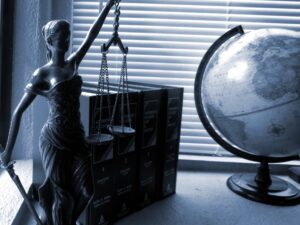
The American Bar Association (ABA) Model Rules of Professional Conduct is a set of rules that dictates the standards of legal ethics and professional responsibility for lawyers in the United States.
Although these rules are only models, they allow a consensus regarding legal ethics, and simplify professional responsibility training, as well as the case-by-case application of such rules.
Table of Contents
Professional Responsibility
Duties to the Client
-
Confidentiality
-
Avoiding conflict of interest
-
Due diligence and Competence (law)
-
Avoid commingling
-
Avoid self-dealing
-
Effective assistance
-
Avoid fee splitting
-
Withdrawal from representation
Duties to the Court
-
Disclosure of perjury
-
Disclosure of adverse authority
Duties to the Profession
-
Limitations on legal advertising
-
Report misconduct
Sources of Law
-
ABA Model Rules
Penalties for Misconduct
-
Disbarment Judicial misconduct\
The Rules
- Rule 1.0 Terminology
Client-Lawyer Relationship
- Rule 1.1 Competence
- Rule 1.2 Scope of Representation and Allocation of Authority Between Client and Lawyer
- Rule 1.3 Diligence
- Rule 1.4 Communications
- Rule 1.5 Fees
- Rule 1.6 Confidentiality of Information
- Rule 1.7 Conflict of Interest: Current Clients
- Rule 1.8 Conflict of Interest: Current Clients: Specific Rules
- Rule 1.9 Duties to Former Clients
- Rule 1.10 Imputation of Conflicts of Interest: General Rule
- Rule 1.11 Special Conflicts of Interest for Former and Current Government Officers and Employees
- Rule 1.12 Former Judge, Arbitrator, Mediator or Other Third-Party Neutral
- Rule 1.13 Organization as Client
- Rule 1.14 Client with Diminished Capacity
- Rule 1.15 Safekeeping Property
- Rule 1.16 Declining or Terminating Representation
- Rule 1.17 Sale of Law Practice
- Rule 1.18 Duties to Prospective Client
Counselor
- Rule 2.1 Advisor
- Rule 2.3 Evaluation for Use by Third Persons
- Rule 2.4 Lawyer Serving as Third-Party Neutral
Advocate
- Rule 3.1 Meritorious Claims and Contentions
- Rule 3.2 Expediting Litigation
- Rule 3.3 Candor toward the Tribunal
- Rule 3.4 Fairness to Opposing Party and Counsel
- Rule 3.5 Impartiality and Decorum of the Tribunal
- Rule 3.6 Trial Publicity
- Rule 3.7 Lawyer as Witness
- Rule 3.8 Special Responsibilities of a Prosecutor
- Rule 3.9 Advocate in Non adjudicative Proceedings
Transactions with Persons Other Than Clients
- Rule 4.1 Truthfulness in Statements to Others
- Rule 4.2 Communication with Person Represented by Counsel
- Rule 4.3 Dealing with Unrepresented Person
- Rule 4.4 Respect for Rights of Third Persons
Law Firms and Associations
- Rule 5.1 Responsibilities of a Partner or Supervisory Lawyer
- Rule 5.2 Responsibilities of a Subordinate Lawyer
- Rule 5.3 Responsibilities Regarding Nonlawyer Assistance
- Rule 5.4 Professional Independence of a Lawyer
- Rule 5.5 Unauthorized Practice of Law; Multijurisdictional Practice of Law
- Rule 5.6 Restrictions on Rights to Practice
- Rule 5.7 Responsibilities Regarding Law-related Services
Public Service
- Rule 6.1 Voluntary Pro Bono Public Service
- Rule 6.2 Accepting Appointments
- Rule 6.3 Membership in Legal Services Organization
- Rule 6.4 Law Reform Activities Affecting Client Interests
- Rule 6.5 Nonprofit and Court Annexed Limited Legal Services Programs
Information About Legal Services
- Rule 7.1 Communication Concerning a Lawyer’s Services
- Rule 7.2 Advertising
- Rule 7.3 Solicitation of Clients
- Rule 7.4 Communication of Fields of Practice and Specialization
- Rule 7.5 Firm Names and Letterhead
- Rule 7.6 Political Contributions to Obtain Legal Engagements or Appointments by Judges
Maintaining the Integrity of the Profession
- Rule 8.1 Bar Admission and Disciplinary Matters
- Rule 8.2 Judicial and Legal Officials
- Rule 8.3 Reporting Professional Misconduct
- Rule 8.4 Misconduct
- Rule 8.5 Disciplinary Authority; Choice of Law
Confidentiality, Ethics, Confidence. ASTA-USA securely handles sensitive materials with the same rules as the ABA.
Get the help you need – Contact ASTA-USA.
In a hurry? Call us for your free quote today: 1.866.446.1860.